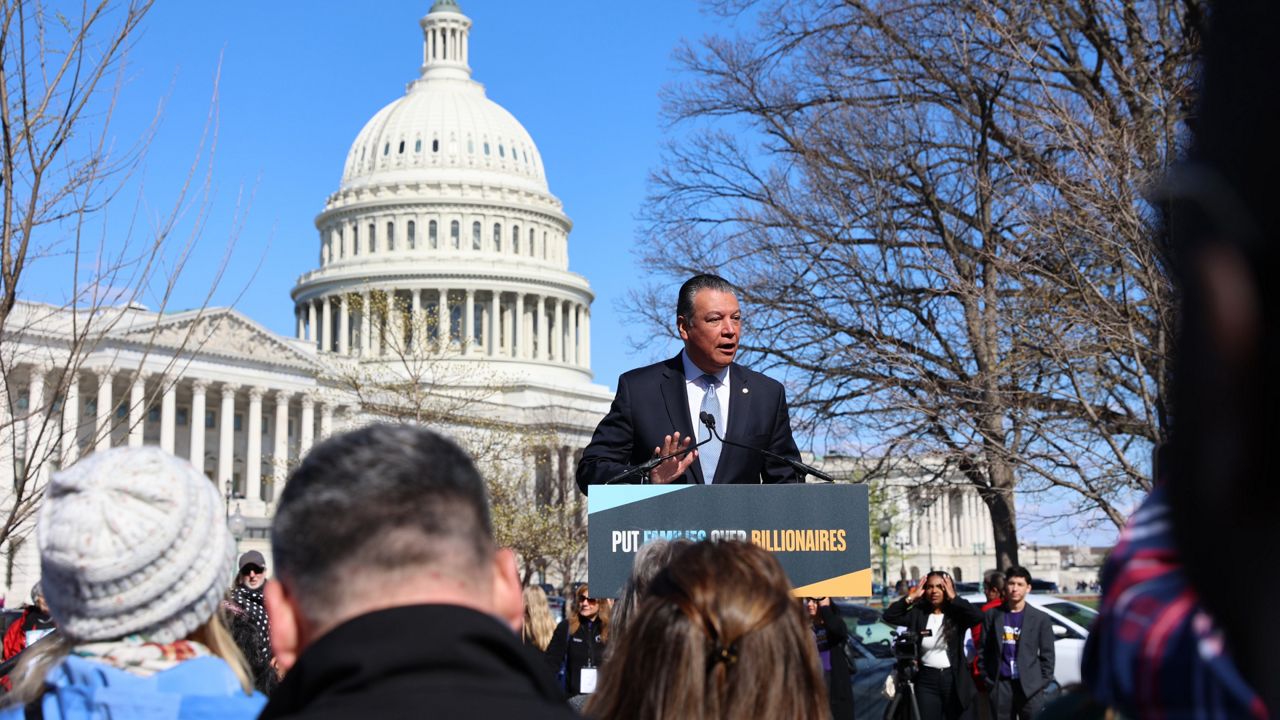As the former president continues to face legal troubles, a pair of Donald Trump's most staunch Republican allies in Congress are pushing to expunge his two impeachments.
But legal scholars are wary of the strategy — and so are some moderate House Republicans, who could kill the measure should it come up for a vote.
Last month, conservative firebrand Rep. Marjorie Taylor Greene, R-Ga., and New York Rep. Elise Stefanik, the No. 3 Republican in the House, introduced legislation to expunge former President Donald Trump's dual impeachments.
Greene's resolution would expunge the former president's 2019 impeachment, for abuse of power and obstruction of Congress stemming from a phone call with Ukrainian President Volodymyr Zelenskyy. Trump was accused of withholding military aid to Ukraine in an effort to have them investigate political rival Joe Biden. The House voted in bipartisan fashion to bring charges against Trump, who was later acquitted by the Senate.
Stefanik's measure would eliminate Trump's 2021 impeachment, for incitement of insurrection in the aftermath of the Jan. 6, 2021, riot at the U.S. Capitol, when a mob of his supporters stormed the building as lawmakers met to certify Biden's win in the 2020 election. Though seven Republicans joined 50 Democrats in a vote to convict Trump, the largest bipartisan margin for an impeachment vote in U.S. history, it fell short of the 67 votes required and Trump was, again, acquitted.
In a joint statement, both GOP lawmakers accused Democrats of weaponizing the impeachment process in both cases, despite bipartisan support for the second in both the House and Senate. House Speaker Kevin McCarthy, R-Calif., said last month that he supports the idea.
"I think it is appropriate," he told reporters. "Just as I thought before ... you should expunge it, because it never should have gone through."
POLITICO on Thursday reported that McCarthy promised Trump he would hold a vote to expunge both impeachments, but the California Republican denied that any such agreement existed.
"There’s no deal," McCarthy told reporters. "But I’ve been very clear, from long before, when I voted against impeachments, that they did it for purely political purposes.
"I support expungement, but there’s no deal out there," he added.
The goal of the resolutions introduced by Greene and Stefanik is to make it "as if such Articles of Impeachment had never passed the full House of Representatives." But when asked if the House can take such an action, Georgetown University professor David Super, a constitutional law expert, put it very simply: "No."
"There's nothing to expunge from and there's no legal authority for an expungement," Super told Spectrum News, calling the House Republicans' effort "pure theater."
"There's no provision in the Constitution for undoing an impeachment," Super said. "There's also no legal effect of an impeachment that doesn't result in a conviction, so there's nothing for the House to cancel."
"It's a fact of history that Andrew Johnson was impeached once, Bill Clinton was impeached once and Donald Trump was impeached twice," he added. "And annuling that is like saying you're going to annul Paul Revere's ride. It happened whether you like it or not."
The impeachment process is clearly laid out in the U.S. Constitution, and it does not include any procedure for undoing an impeachment after the House has voted. Super pointed out the country's founders did spell out how certain actions can be reversed, including impeaching someone who had been appointed or elected.
"There's nothing in the Constitution that authorizes just the House to take an action of this kind," Super said. "And since the framers certainly knew how to write that, as to those who wrote some of the amendments, we have to assume that there's no such power exists."
"The Constitution does not provide any legal effect for an impeachment except that it authorizes a trial of conviction in the Senate," Super later added. "There were two impeachments, neither resulted in a conviction in the Senate and it has no legal effect. You can't undo something that has no effect in the first place and it would be very strange if the framers saw any reason to do that. This is pure theater"
George Washington University professor Jonathan Turley, a constitutional law expert summoned by Republicans during Trump's first impeachment trial, concurred, telling The Washington Post that there's "no provision for expungement of an impeachment" in the Constitution.
“Impeachment is not like a constitutional DUI that can be expunged,” he told the outlet. “It became vested and settled with the majority vote on Jan. 13, 2021.”
Several House Republicans spoke out, questioning the need for such a vote considering Trump was acquitted. Such a vote could put vulnerable Republicans at risk, opening them up to a line of attack from Democrats hoping to flip their seats next year should they back the vote, or the ire of the former president should they oppose it.
"It doesn’t make sense to me," Nebraska Rep. Don Bacon, who holds a seat being targeted by Democrats next year, told POLITICO. "Because if you’re found not guilty, what do we expunge? I think it’s silly. We should be moving forward, not backwards."
“What is there to expunge? He was acquitted at trial," New York GOP Rep. Mike Lawler, another Democratic target, told reporters. "I don’t really see the purpose of it."
In an interview with Spectrum News, House Democratic leader Hakeem Jeffries, D-N.Y., outlined his party’s position: “The extreme MAGA Republicans are more concerned with settling scores on behalf of the former twice impeached, President of the United States of America, the insurrectionist in chief, Donald Trump, instead of solving problems for the American people.”
Super also points out that even if Republicans do move ahead with this effort, expunging Trump's impeachments would not make Americans forget they happened.
"We all know what happened," Super said. "We saw it on TV. It's memorialized on the internet."









